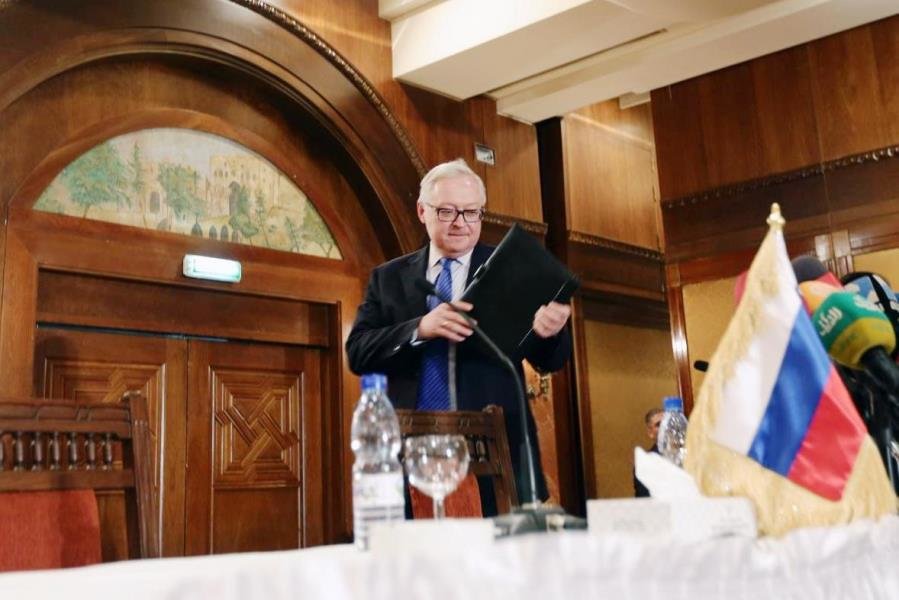U.S. pressure campaign meant to blackmail Iran: Russia

TEHRAN – Russia’s deputy foreign minister has said that Washington is exerting pressure on Iran in a bid to “blackmail” the country, adding that Washington does not seem to be sincere in its offer to engage in dialog with Tehran.
In an interview with Russia’s Rossiyskaya Gazeta daily released on Wednesday, Ryabkov complained that the U.S. was just stepping up its pressure campaign against Iran without providing “alternative options” for the Islamic Republic.
“We can see the severe pressure on the part of the United States toward Iran and the attempts to blackmail this country,” he said, according to a translation of the interview by Press TV. “At the same time, there is no positive agenda and the United States is not suggesting any alternative options. It only declares, including on the high level, that it is open for dialogue. But it is not a basis for real talks.”
If the U.S. was willing to hold talks with Iran, it should make suggestions on what it was ready to offer Iran in exchange for the discussions, he added.
Last year, U.S. President Donald Trump unilaterally pulled his country out of the 2015 nuclear deal, officially called the Joint Comprehensive Plan of Action (JCPOA), and unleashed the “toughest ever” sanctions against Tehran, notably targeting its key oil exports.
Recently, Washington beefed up its military presence in the Persian Gulf, citing alleged and unspecified threats posed by the Islamic Republic to American troops and interests.
Ryabkov says outward claims that the U.S. is open for dialogue do not provide a basis for real talks.
On May 8, the first anniversary of Washington’s exit from the JCPOA, The Islamic Republic announced its decision to stop exporting excess uranium and heavy water for a 60-day period, during which the remaining signatories would have to honor their promises and ensure that is no more deprived of the economic benefits it was promised under the agreement.
Elsewhere in his interview, Ryabkov warned against the consequences of Tehran’s strengthening intentions to withdraw from the JCPOA.
“This may pave the way for a collapse of the JCPOA and the emergence of a chaotic situation, in which risks of a military confrontation would further increase,” he said.
On Wednesday, the Russian official met with Iran’s Deputy Foreign Minister for Political Affairs Abbas Araqchi in Tehran to discuss the fate of the nuclear accord.
Following the meeting, Ryabkov said that Tehran would undoubtedly take new steps to suspend its commitments under the JCPOA unless the deal’s balance is restored.
“Amid a lack of progress on how to restore a balance inside the JCPOA, Iran’s next steps will become inevitable. We have no doubt about that,” he told Russia’s TASS news agency.
Ryabkov refutes Bolton’s claim of Iran’s role in UAE oil tankers attack
Elsewhere, the top Russian diplomat said his country does not trust claims by U.S. National Security Advisor John Bolton that Iran was engaged in recent “sabotage” attacks targeting vessels off the coast of the United Arab Emirates.
On Wednesday, Bolton alleged that the May 12 incident involving four commercial vessels near the port of Fujairah had been caused by Iranian naval mines, without providing any evidence to substantiate his claim. “I think it is clear these (tanker attacks) were naval mines almost certainly from Iran,” claimed the American official, speaking at a press conference in Abu Dhabi.
Ryabkov fundamentally questioned the remarks in an interview with Sputnik, which the Russian news agency published on Thursday.
“We’ve seen countless situations when Americans adjusted certain facts or events to political orders and their own narrow national beliefs of what happens and how it happens, and how something should be done,” Ryabkov said, adding, “This is not even the UK ‘highly likely,’ this is something worse. They are just presumptuously imposing their opinion on the whole world or at least trying to do so.”
The Russian official also warned that such unfounded statements served to escalate tensions. “Such policies are especially dangerous in the Middle East.”
“This is why we will continue calmly making effort to ensure that common sense eventually prevails,” he noted, advising adoption of “a more sensible approach” where “responsible officials engage in diplomacy rather than propaganda.”
Bolton has earned notoriety as the most hawkish figure in the U.S. administration, openly promoting military conflict with Iran and other countries.
Iran has called Bolton a member of the anti-Iran B-Team -- also featuring Abu Dhabi Crown Prince Mohammed bin Zayed Al Nahyan, Israeli Prime Minister Benjamin Netanyahu, and Saudi Crown Prince Mohammed bin Salman -- which is trying hard to target the people of Iran with “economic terrorism.”
Saudi Arabia and the UAE have been supportive of the U.S. policy of “maximum pressure” against Iran, which has seen Washington returning its sanctions against Tehran, and militarizing the region.
Earlier this year, the Arab states vowed to make up for potential shortages of Iran’s crude after the U.S. vowed to reduce Iran’s oil exports to “zero” as part of the maximum pressure campaign.
Russia supports Japan’s plan to deescalate U.S.-Iran tensions
Meanwhile, a Japanese official said on Thursday that Russia has expressed support for Japan’s plan to play a role in easing tensions between Iran and the U.S.
The Japanese official made the remarks to during a media briefing after a meeting of Japan and Russia’s foreign and defense ministers, Press TV reported.
“Traditionally Japan has had friendly ties with Iran,” the official said, adding, “There were comments from the Japanese side that Japan aims to play a role by taking advantage of such ties. The Russian side made a very positive comment in response.”
SP/PA
